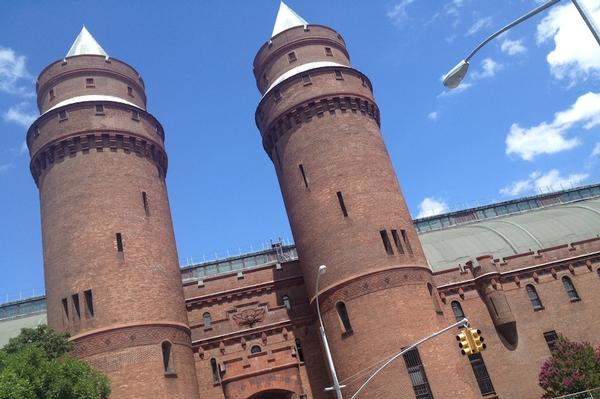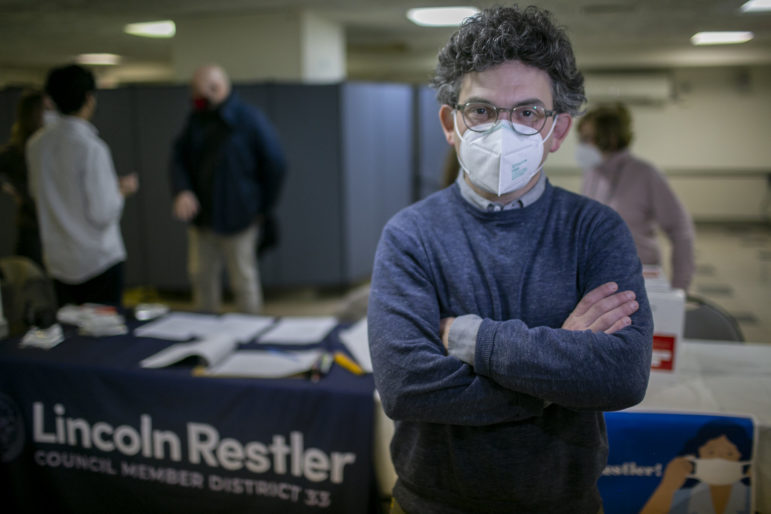“Public land is a treasure that we need to maximize for truly affordable housing,” said Councilmember Lincoln Restler, whose new bill would prevent the city from selling off land to private, for-profit developers unless no qualified nonprofit group makes an offer.

Jordan Moss
The Kingsbridge Armory, a massive city-owned property in The Bronx, has sat unused for decades.New York City community land trusts and nonprofit developers could get the first crack at securing publicly-owned land for affordable housing under a new bill introduced by Brooklyn Councilmember Lincoln Restler Thursday.
The legislation is intended to maximize affordable housing development by preventing the mayor and city agencies from selling off land to private, for-profit developers unless no qualified nonprofit group steps in to make an offer, Restler said. Too often, he added, the city has disposed of its most valuable asset—its land—without securing sufficient affordable housing commitments from developers.
“Public land is a treasure that we need to maximize for truly affordable housing and for good jobs and for what our communities actually need,” Restler said. “I think every progressive organization and elected official is in staunch agreement that 100 percent affordable housing on every publicly owned site is a prerequisite to considering development.”
The bill, which so far has 19 co-sponsors, revives a piece of legislation first introduced by former Councilmember Brad Lander in 2021.
Restler said he was motivated to reintroduce the bill by the sale of the Bedford Union Armory, a city-owned property in Brooklyn, to a private firm that won rezoning approval to build 415 apartments in 2017. Some 250 of the apartments will have rents capped for families earning 60 percent of area median income, or about $72,000 for a family of three. The rest of the apartments are priced at whatever the owner can get on the open market.
“There was deep opposition to a redevelopment of a city-owned armory that included substantial amounts of luxury housing,” Restler said. “I think that moved the conversation and the advocacy whereas there is now broad consensus that every public owned site needs to be maximized for public good.”

William Alatriste/NYC Council Media Unit
The bill’s sponsor, Lincoln Restler.He has already taken a stand against the transfer of public land to private firms in his district at the site of an MTA-owned bus-washing station at 40 Quay Street in Greenpoint. The MTA agreed to lease the land to the developer Gotham for $39 million in 2022. Gotham plans to build a 900-unit tower, with a quarter of units priced for low- and middle-income tenants.
More than three-quarters of all city-owned sites that were redeveloped between 2015 to 2018 were awarded to for-profit developers, at times for as little as $1, according to an analysis by Restler’s office.
The legislation could be a boon for the city’s burgeoning community land trusts (CLT) movement, a network of nonprofit organizations that purchase a property and retain the land while leasing apartments at permanently affordable rates. Residents can also purchase and maintain ownership of homes on CLT land, but they are barred from reselling for significant profits, curbing the kind of speculation that has eroded affordable housing options in neighborhoods like East New York and Central Brooklyn.
“This bill will be a game-changer for community land trusts across the City,” said Will Spisak, senior program associate at New Economy Project, which coordinates with CLTs across the five boroughs. “For decades the city has given precious public land to for-profit developers who build luxury housing and other projects that displace Black, brown, and immigrant New Yorkers.”
There are around 400 CLT units citywide, mostly managed by the Cooper Square CLT in the Lower East Side as well as El Barrio CLT in East Harlem and the Interboro CLT, which has property in Brooklyn, with additional buildings in the pipeline in The Bronx and Queens. About 1,000 CLT units were in “pre-development” stages last year, a top HPD official testified at a Council hearing last year.
A similar bill introduced by Councilmember Carlina Rivera in April would give CLTs and nonprofit developers first dibs on all sales, including privately owned properties.
Restler said he supports Rivera’s bill and considers his measure “even lower-hanging fruit.”
“Right of first refusal is an enormous opportunity and something that has been successfully implemented in other cities,” he said. Washington D.C. and San Francisco both have versions of the legislation on the books.
The bill comes as rent prices are skyrocketing across the city, and the availability of affordable apartments is at a decades-long low: Less than 1 percent of units priced below $1,500 a month sit empty, the city’s most recent housing vacancy survey found, the lowest rate since 1991.
The measure could pose an obstacle to the Departments of Housing Preservation (HPD) when it comes to selling property, but an agency spokesperson said the intent of the legislation seems to coincide with Mayor Eric Adams’ housing plan.
“As the Housing Our Neighbors blueprint lays out, this administration is laser-focused on making New York an affordable place to live, and supporting our non-profit partners in the process, said HPD spokesperson William Fowler. “We look forward to reviewing this bill and working with our partners in the Council to accomplish our shared goals.”









2 thoughts on “Legislation Would Give Nonprofits First Crack at Developing NYC-Owned Land ”
Now THIS is good legislation. You love to see it, especially in my neighborhood. i think the kids are saying pogchamp, and this is very pogchamp.
These lots should be sold to the highest bidder. It’s an insult to taxpayers for the city to give away public land.